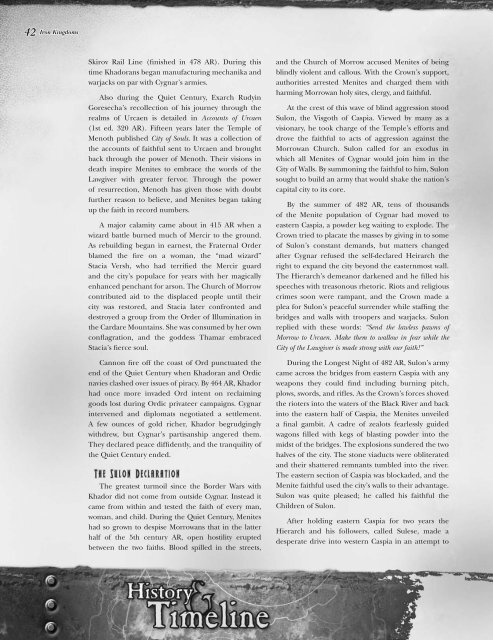02 - Iron Kingdoms W.. - Captain Spud Is Amazing
02 - Iron Kingdoms W.. - Captain Spud Is Amazing
02 - Iron Kingdoms W.. - Captain Spud Is Amazing
Create successful ePaper yourself
Turn your PDF publications into a flip-book with our unique Google optimized e-Paper software.
108.1.141.197<br />
42 <strong>Iron</strong> <strong>Kingdoms</strong><br />
Skirov Rail Line (finished in 478 AR). During this<br />
time Khadorans began manufacturing mechanika and<br />
warjacks on par with Cygnar’s armies.<br />
Also during the Quiet Century, Exarch Rudyin<br />
Goresecha’s recollection of his journey through the<br />
realms of Urcaen is detailed in Accounts of Urcaen<br />
(1st ed. 320 AR). Fifteen years later the Temple of<br />
Menoth published City of Souls. It was a collection of<br />
the accounts of faithful sent to Urcaen and brought<br />
back through the power of Menoth. Their visions in<br />
death inspire Menites to embrace the words of the<br />
Lawgiver with greater fervor. Through the power<br />
of resurrection, Menoth has given those with doubt<br />
further reason to believe, and Menites began taking<br />
up the faith in record numbers.<br />
A major calamity came about in 415 AR when a<br />
wizard battle burned much of Mercir to the ground.<br />
As rebuilding began in earnest, the Fraternal Order<br />
blamed the fire on a woman, the “mad wizard”<br />
Stacia Versh, who had terrified the Mercir guard<br />
and the city’s populace for years with her magically<br />
enhanced penchant for arson. The Church of Morrow<br />
contributed aid to the displaced people until their<br />
city was restored, and Stacia later confronted and<br />
destroyed a group from the Order of Illumination in<br />
the Cardare Mountains. She was consumed by her own<br />
conflagration, and the goddess Thamar embraced<br />
Stacia’s fierce soul.<br />
Cannon fire off the coast of Ord punctuated the<br />
end of the Quiet Century when Khadoran and Ordic<br />
navies clashed over issues of piracy. By 464 AR, Khador<br />
had once more invaded Ord intent on reclaiming<br />
goods lost during Ordic privateer campaigns. Cygnar<br />
intervened and diplomats negotiated a settlement.<br />
A few ounces of gold richer, Khador begrudgingly<br />
withdrew, but Cygnar’s partisanship angered them.<br />
They declared peace diffidently, and the tranquility of<br />
the Quiet Century ended.<br />
The Sulon Declaration<br />
The greatest turmoil since the Border Wars with<br />
Khador did not come from outside Cygnar. Instead it<br />
came from within and tested the faith of every man,<br />
woman, and child. During the Quiet Century, Menites<br />
had so grown to despise Morrowans that in the latter<br />
half of the 5th century AR, open hostility erupted<br />
between the two faiths. Blood spilled in the streets,<br />
and the Church of Morrow accused Menites of being<br />
blindly violent and callous. With the Crown’s support,<br />
authorities arrested Menites and charged them with<br />
harming Morrowan holy sites, clergy, and faithful.<br />
At the crest of this wave of blind aggression stood<br />
Sulon, the Visgoth of Caspia. Viewed by many as a<br />
visionary, he took charge of the Temple’s efforts and<br />
drove the faithful to acts of aggression against the<br />
Morrowan Church. Sulon called for an exodus in<br />
which all Menites of Cygnar would join him in the<br />
City of Walls. By summoning the faithful to him, Sulon<br />
sought to build an army that would shake the nation’s<br />
capital city to its core.<br />
By the summer of 482 AR, tens of thousands<br />
of the Menite population of Cygnar had moved to<br />
eastern Caspia, a powder keg waiting to explode. The<br />
Crown tried to placate the masses by giving in to some<br />
of Sulon’s constant demands, but matters changed<br />
after Cygnar refused the self-declared Heirarch the<br />
right to expand the city beyond the easternmost wall.<br />
The Hierarch’s demeanor darkened and he filled his<br />
speeches with treasonous rhetoric. Riots and religious<br />
crimes soon were rampant, and the Crown made a<br />
plea for Sulon’s peaceful surrender while staffing the<br />
bridges and walls with troopers and warjacks. Sulon<br />
replied with these words: “Send the lawless pawns of<br />
Morrow to Urcaen. Make them to wallow in fear while the<br />
City of the Lawgiver is made strong with our faith!”<br />
During the Longest Night of 482 AR, Sulon’s army<br />
came across the bridges from eastern Caspia with any<br />
weapons they could find including burning pitch,<br />
plows, swords, and rifles. As the Crown’s forces shoved<br />
the rioters into the waters of the Black River and back<br />
into the eastern half of Caspia, the Menites unveiled<br />
a final gambit. A cadre of zealots fearlessly guided<br />
wagons filled with kegs of blasting powder into the<br />
midst of the bridges. The explosions sundered the two<br />
halves of the city. The stone viaducts were obliterated<br />
and their shattered remnants tumbled into the river.<br />
The eastern section of Caspia was blockaded, and the<br />
Menite faithful used the city’s walls to their advantage.<br />
Sulon was quite pleased; he called his faithful the<br />
Children of Sulon.<br />
After holding eastern Caspia for two years the<br />
Hierarch and his followers, called Sulese, made a<br />
desperate drive into western Caspia in an attempt to


